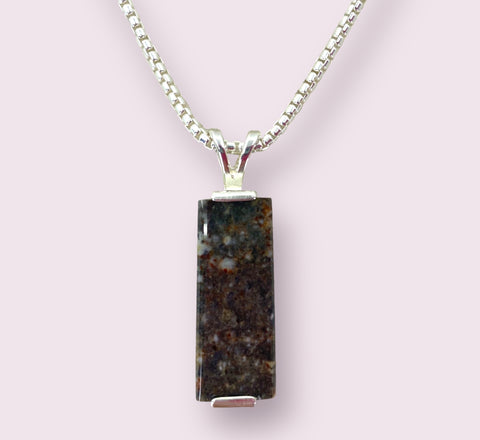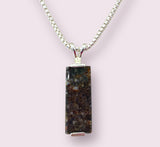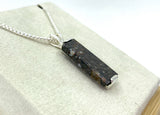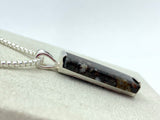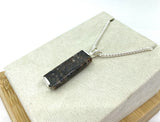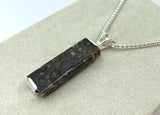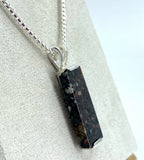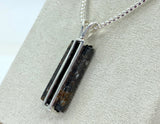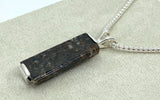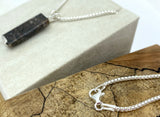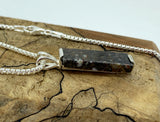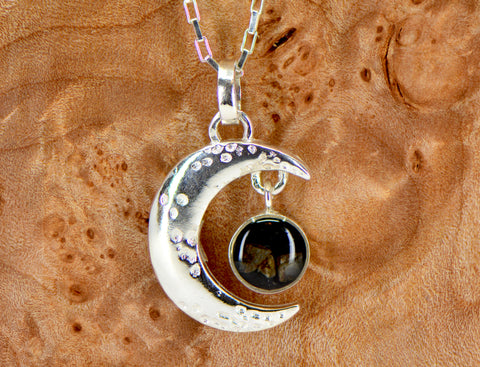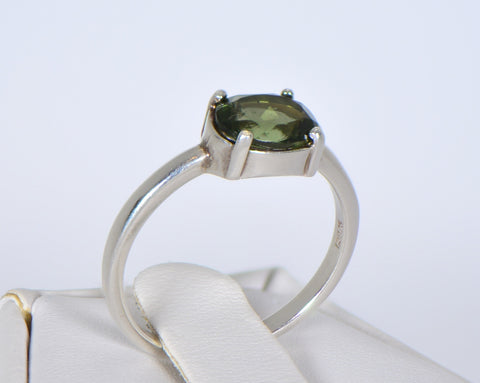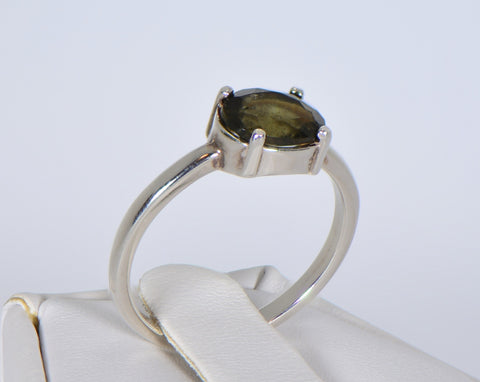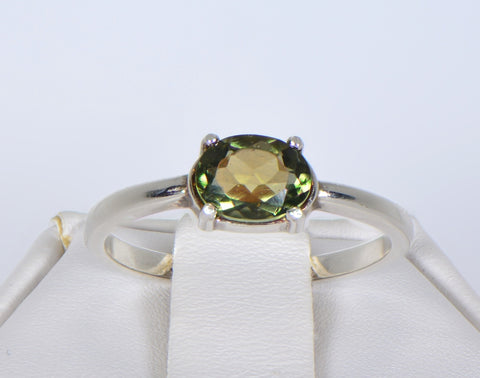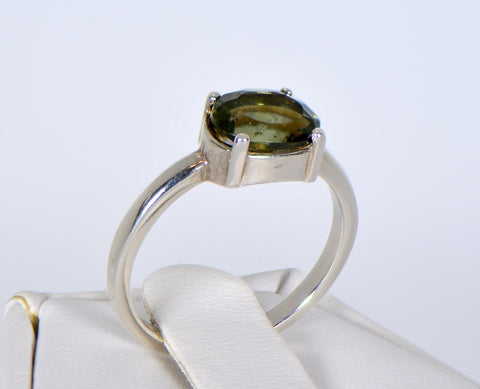Lunar Meteorite Jewelry I The Moon Bar Necklace

The Moon Bar necklace - lunar meteorite pendant
The Moon Bar Center Stone: Hand shaped Lunar Meteorite. This meteorite was found in Mali by camel shepherds in January 2021. This is a real piece of the Moon that was ejected by a meteorite impact on the surface of our Moon. The ejecta from that impact eventually landed on Earth as a meteorite. This lunar meteorite is classified as a Feldspathic Lunar Breccia.
Setting and Chain (optional): 925 Silver
Description: Moon Bar is a unique handcrafted Lunar Meteorite Pendant with center stone fashioned from a piece of the Moon. Made from the beautiful lunar meteorite NWA 14041 and set in Sterling Silver. Accompanying Sterling Silver necklace is available in 18" and 22" lengths.
Dimensions not including bail: 26mm x 9.5mm x 5.41mm
Dimensions including bail: 33.33 mm x 9.5mm x 6.35mm
Official name: NWA 14041
Type: Lunar feldspathic breccia
Year Found: 2021
Country: Mali
Parent body: The Moon - this material was ejected from our only natural satellite when the Moon was hit by another meteorite. It should be noted that we do not know exactly which crater this lunar meteorite was ejected from.
This beautiful moon pendant has been hand crafted and assembled in the US by AZ based artisan Josh Eisler. Each pendant has a unique center stone and it is a completely unique part of the Moon. No two pendants are exactly alike. The center stone for this pendant was ejected from the Moon and recovered in Mali by camel shepherds in 2021. The center stone has been free-hand shaped to find the best qualities in each area of the stone, and making every piece totally unique. The pendant is set in .925 Sterling Silver.
The story: Our Moon takes a lot of hits. This is evidenced by the millions of craters that cover the moon's surface. Thankfully the bombardments have slowed down considerably in the last few hundred thousand years, but they still do occur from time to time. Lunar meteorites are material ejected from our Moon's surface when it gets hit by a meteorite. If the impact has enough energy, some of the ejecta gets thrown so far it escapes the Moon's gravity becoming meteoroids hurtling through space. Some of those lunar meteoroids have the potential to eventually fall into Earth's gravity well and go screaming through the atmosphere to hit the surface. Once they hit the Earth's surface, they earn the designation of being a meteorite. Much later, perhaps thousands of years later, an even smaller fraction of the meteorites that didn't fall into the oceans or onto unrecoverable terrain, are recovered by nomads and others who happen to find them. Nothing short of miraculous odds. To describe them as rare, is perhaps an understatement.
| Northwest Africa 14041 | |||||||||||||||||||||||||||||||
|---|---|---|---|---|---|---|---|---|---|---|---|---|---|---|---|---|---|---|---|---|---|---|---|---|---|---|---|---|---|---|---|
| Basic information |
Name: Northwest Africa 14041 This is an OFFICIAL meteorite name. Abbreviation: NWA 14041 Observed fall: No Year found: 2021 Country: Mali Mass:  11.7 kg 11.7 kg |
||||||||||||||||||||||||||||||
| Classification history: |
This is 1 of 240 approved meteorites classified as Lunar (feldsp. breccia). [show all] Search for other: Lunar meteorites |
||||||||||||||||||||||||||||||
| Comments: | Approved 6 Jul 2021 | ||||||||||||||||||||||||||||||
Writeup |
Writeup from MB 110:
Northwest Africa 14041 (NWA 14041) Mali Purchased: 2021 Feb Classification: Lunar meteorite (feldspathic breccia) History: Found in Mali by camel shepherds in January 2021 and subsequently purchased in Algeria by Ahmed Salek. Petrography: (A. Irving, UWS and P. Carpenter, WUSL) Breccia composed of mineral clasts of anorthite, olivine, low-Ca pyroxene, pigeonite, exsolved pigeonite and minor Ti-chromite set in a fine grained matrix containing minor secondary calcite and a K-Ca-bearing zeolite phase. Geochemistry: Olivine (Fa29.0-51.5, FeO/MnO = 99-102, N = 4), low-Ca pyroxene (Fs23.3Wo3.7, FeO/MnO = 60), pigeonite (Fs32.6-68.1Wo8.7-19.5, FeO/MnO = 52-75, N = 4), pigeonite host (Fs42.0Wo10.4, FeO/MnO = 66), augite exsolution lamella (Fs22.1Wo40.6, FeO/MnO = 71), anorthite (An90.8-96.0Or0.1, N = 3). Classification: Lunar (feldspathic breccia). Specimens: 23.6 g in the form of a polished endcut at UWB; remainder with Mr. A. Salek. |
||||||||||||||||||||||||||||||
| Data from: MB110 Table 0 Line 0: |
|
||||||||||||||||||||||||||||||
| Institutions and collections |
UWS: University of Washington, Department of Earth and Space Sciences, 70 Johnson Hall, Seattle, WA 98195, United States (institutional address; updated 15 Jan 2012) WUSL: Washington Univ., One Brookings Drive, St. Louis, MO 63130, United States (institutional address; updated 17 Oct 2011) UWB: University of Washington, Box 353010 Seattle, WA 98195, United States (institutional address; updated 27 Jul 2012) |
||||||||||||||||||||||||||||||
We Also Recommend

